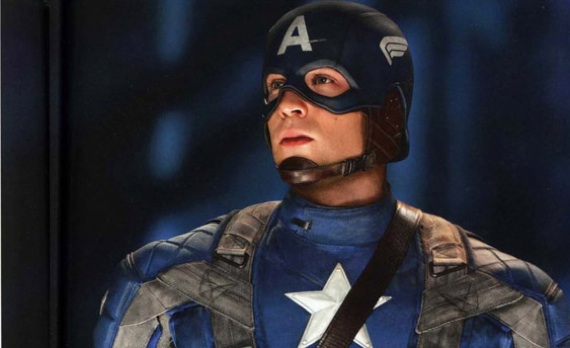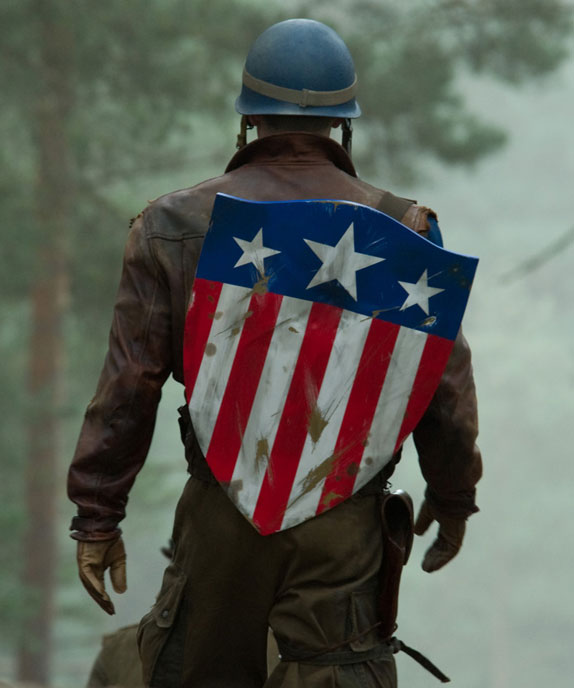Cap Producer Speaks!
None
"Let's peel back the layers of history..."

SFX was on set for this summer's much-anticipated Captain America - The First Avenger and, inbetween dodging Doodlebugs and Hydra machine gun fire, we cornered producer Stephen Broussard for a chat. Here's what he had to say...
Is the 1940s setting a tough sell for a modern audience?
I think it’s the job of any movie to establish the reality of that world. Whether it’s modern day Manhattan, or a pirate ship, or a space ship, as an audience member you need to convince me that what’s happening is happening now and it really matters to those characters. It’s not purely the domain of this movie – it’s the challenge of any storyteller, any filmmaker.
For the public, Captain America isn’t quite in the echelon of Superman or Batman, but he does have one of the most iconic costumes in comic books…
Yeah, that’ll benefit us just from recognition factor alone. I think as people get to know the character and the story, past that first visual recognition, they’ll only be more intrigued.
Are you making nods to classic war movies?
Get sneak previews, exclusive competitions and details of special events each month!
World War 2, as well as being an historical event, has also become a movie genre. The Dirty Dozen team is a genre with its established tropes, whether it’s Inglourious Basterds or Operation Crossbow . It’s an established movie genre where you can have fun playing with the conventions and turning them on their ear. What’s the Marvel version of that?
Are you hoping that Captain America will show that sub-genres are possible in superhero movies?
Yeah, constantly showing people new worlds and new ideas. The Marvel comic book universe is an embarrassment of riches. So many ideas and stories and settings that we’ve only just scratched the surface of. There’s definitely more to tell that keeps it alive in ways that are fresh and exciting. The whole conceit of the film starts with the known history and says ‘If you’re willing to come with us, let’s peel back the layers of history…’ Being completely respectful – we’re not suggesting that this is what really happened, and that real people didn’t give their lives – but showing the secret Marvel history, that maybe there was an organisation called Hydra, and an organisation on the other side called the Strategic Scientific Reserve that fought these incredible battles with these amazing villains and machines, and if things had gone very differently history may have been rewritten.

Did you research the story of Cap’s creation?
It’s a fascinating story. March ’41 is when Captain America 1 was published, which if you know your history was well before Pearl Harbor. And through the rose-coloured glasses of where we are now it’s easy to think well, of course we were always going to do the right thing, and of course America was going to join the war… But it was very much not a given, and the country was as divided then as it is today about any issue. I think it’s very cool to think about two comic book guys in New York making a political statement for what was so clearly the right thing to do then. Joe Simon, the co-creator, is still with us, and he told us stories about being spat on for taking such a pro-Europe stance. It was post-WW1, post-Great Depression, it was Europe’s war. People said “We’ve no business there!” The country was divided. So even going back to the earliest days of Cap you could see that he was a divisive figure, a controversial figure, a figure that people wanted to project what they thought was right through. And that’s never really changed, and I’m sure there will be debates when the movie comes out, on both sides of the political spectrum. And to me that’s exciting, that’s the reason to do it. That’s what makes the character relevant and interesting, and we shouldn’t be afraid of a little healthy discussion.
Why the decision to film in Britain?
We were always going to come here for a portion of it, because of the period setting. It’s easier to recreate World War 2 in England than it is in Manhattan Beach! It just made sense to move the whole thing here. I feel like we’re working in the shadow of some of my favourite films – Star Wars , Superman , Raiders , they all shot here… the Bourne franchise, Harry Potter, James Bond… This is franchise territory! It’s been pretty cool to shoot on the same stage that the monolith was shot for 2001 . It’s a holy place for me.
How easy will it be to transition Cap to the modern day?
That’s the next stage. We’ll be headed towards The Avengers . But I think the future is unwritten – there may be opportunities to go back. We haven’t thought too far ahead about that, but the characters and the world… it’d be a shame to leave it all behind. If it made sense, if there was a way to do it logically that didn’t involve Cap getting into his time machine!
What will blow fans away the most in this movie?
The action’s pretty spectacular. Joe storyboarded the truck chase sequence in Raiders Of The Lost Ark , for god’s sakes – it doesn’t get much better than that. And obviously he’s had many, many directing credits since then, only refining his sense of action and shooting ability. There are going to be some pretty incredible sequences, in ways that are unexpected for what it is. These action sequences have to rattle modern audiences. And it’s an emotional story – at the end of the day it’s quite risky how emotional it is, this character’s journey, and where we take him and where he ends up. I think people could be very moved by it. It’s not just action – there’s a real opportunity here for people to leave the theatre feeling moved in a way that may be unexpected for this type of genre.
Read more from Stephen Broussard in the next issue of Comic Heroes, on sale 27 June. And be sure to check out SFX 211, on sale 29 June, for more spectacular Captain America coverage.

Nick Setchfield is the Editor-at-Large for SFX Magazine, writing features, reviews, interviews, and more for the monthly issues. However, he is also a freelance journalist and author with Titan Books. His original novels are called The War in the Dark, and The Spider Dance. He's also written a book on James Bond called Mission Statements.


